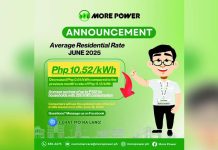
ON Aug. 8, incoming Energy Regulatory Commission (ERC) chairperson Monalisa Dimalanta said that she wants to open up the ERC so as to find new ways of producing and enforcing regulations in a bid to make it a center of excellence in Southeast Asia.
Wow!
I interpret the sobriquet “center of excellence” to mean a lack of corruption.
Berlin-based Transparency International in 2021 assigned the Philippines the position of 115th (out of 172 countries) in the corruption league table. The ERC has never been a beacon of probity here. Therefore, I believe that ERC is a significant contributor to our lowly position.
Dimalanta is the seventh chairperson and CEO of ERC and will serve for a seven-year term which will expire on July 10, 2029. Will she seek help from other government agencies in order to reduce ERC’s level of corruption? The Ombudsman perhaps?
Southeast Asia includes Singapore which regularly appears in the top 10 of the least corrupt countries. Dimalanta says: ‘we can do exchange programs with other regulators in the region so that they can learn from us, and we can learn from them.’
I wish her well, but she has an uphill task. Is she satisfied that her ERC colleagues are all lilywhites?
If not, then she has a problem. ERC Commissioners are appointed for a fixed term, and it will be difficult for her to fire anyone she believes to be unsuitable.
Decision-making is problematic. I live in Bacolod City, the unhappy home of the Central Negros Electric Cooperative Inc., (CENECO). Over the years, CENECO has signed contracts (‘with the provisional authority of the ERC’ according to CENECO’s Board) which are not demonstrably in the interest of CENECO’s member consumers.
For example, in 2011, CENECO signed a contract with Kepco-Salcon. This contract ensured that CENECO (and therefore CENECO’s consumers) will incur penalty costs if CENECO does not buy all the contracted electricity.
No problem, I thought. CENECO’s Board, underpinned by its full-time permanent staff is not likely to commit to purchasing electricity that it is not going to use.
I was wrong.
In 2012, it was clear that CENECO was not able to consume all the electricity that it contracted to buy. I should also mention that this contract was also approved by ERC.
What happened next was predictable.
In 2013, Kepco-Salcon, accompanied by pusillanimous CENECO, made representations to ERC to seek permission to penalize CENECO’s hapless consumers to pay for the electricity that they did not ask for, did not want, and did not use.
Understandably, ERC, which approved the faulty contract, was unwilling to make a decision against CENECO’s consumers.
In 2014, Kepco-Salcon, this time unaccompanied by CENECO, repeated the application. Again, ERC did not make a decision.
In 2017, Kepco-Salcon made a third representation to ERC. This time, ERC sided with Kepco-Salcon. CENECO’s consumers were forced to pay P232 million to liquefy its doubtful indebtedness to Kepco.
Dimalanta says ‘ERC will carry a badge of professionalism and unmatched understanding of the energy industry.’
I hope so./PN





